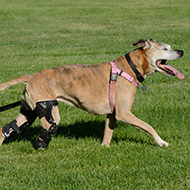RCVS Knowlege announces canine cruciate event

The Registry aims to collect data from vets and dog owners to better understand which surgical tecniques and implants have the best outcomes.
RCVS Knowledge has announced a first-of-its-kind event to collect data on dogs recovering from cruciate surgery.
The Canine Cruciate Registry aims to collect data from veterinary surgeons and dog owners to better understand which surgical techniques and implants have the best outcomes.
The event is taking place virtually on Wednesday 28 July, during which Mark Moreton, clinical lead for the RCVS Knowledge Canine Cruciate Registry, will introduce the registry and show how vets can monitor complications with cruciate surgery, improve outcomes and enhance patient care.
Mark will be joined by a host of speakers across the world, including:
- Dr Stanley Kim, associate professor in small animal surgery at the University of Florida, who will present his work on stifle stability, and outcomes post cruciate surgery.
- Professor Duncan Lascelles, professor of translational pain research and management at North Carolina State University, who will discuss how clinicians can assess clinical outcomes in canine patients.
- Mr Mike McNicholas, a renowned knee surgeon and a member of the steering group for the UK National Ligament Registry and Chair of ICRS Global Cartilage Treatment Registry. Mike will share experiences from human orthopaedic surgery and the benefits of registries in improving patient outcomes.
All UK vets performing cruciate surgery are encouraged to sign up to the registry, which is endorsed by the British Veterinary Orthopaedic Association (BVOA). However, veterinary teams, animal owners and anyone with interest in registries is welcome to attend.
For more information, visit: bit.ly/2URTQZb



 The Veterinary Medicines Directorate (VMD) is inviting applications from veterinary students to attend a one-week extramural studies (EMS) placement in July 2026.
The Veterinary Medicines Directorate (VMD) is inviting applications from veterinary students to attend a one-week extramural studies (EMS) placement in July 2026.